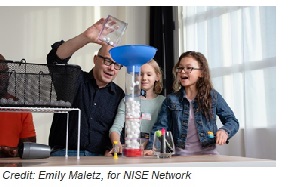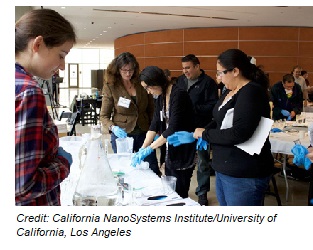

Nanotechnology is a part of various scientific disciplines, such as physics, biology, chemistry, materials science, engineering, and more. As such, it can be taught at various levels and woven into various types of STEM learning.
Based on feedback from the nanoscale science and engineering education community, the NNCO has collaborated with nanoHUB.org to create a teacher-friendly nano education resource portal. All of the below resources (and more!) are included in the searchable database in order to help teachers who are making nanotechnology a part of their lesson plans.
Contact us for up to 400 copies of our educational brochures for students and anyone eager to learn.
CK-12 Foundation – Flexbooks: With a guiding philosophy that learning is a personal journey, CK-12 Foundation was founded with the mission to let everyone learn in his or her own way, by pairing high-quality content with the latest technologies and providing these tools to teachers for free.
The High School Nanoscience Program is a joint effort of the California NanoSystems Institute (CNSI) and the NSF-funded IGERT Materials Creation Training Program (MCTP). The purpose of the program is to bring nanoscience to high school classes in the Los Angeles Unified School District (LAUSD) and throughout the greater Los Angeles area.
How to Identify Effective STEM Activities for Children:Baylor University’s School of Education Online Doctor of Education (EdD) Program developed this online resource on successfully integrating STEM into the classroom for young students.
Institute for Chemical Education: In a collaboration with the Materials Research Science and Engineering Center on Nanostructured Materials and Interfaces at UW–Madison, ICE helped to make hands-on materials related to nanoscience a reality and enabled them to be in classrooms around the world.
Mid-Continent Research for Education and Learning (McREL) NanoTeach: This NSF-funded program that combines an instructional design framework with nanoscale science content using multiple delivery methods for high school science teachers. McREL NanoLeap is specifically geared towards teaching nanoscience and technology.
Molecularium: The Molecularium® Project is the flagship outreach and education effort of Rensselaer Polytechnic Institute's Nanotechnology Center, bringing audiences worldwide into the amazing nanoscale world of atoms and molecules.
Materials World Modules: This Northwestern University project offers for purchase a series of interdisciplinary teaching modules assembled by Northwestern University on nanoscience and materials topics—including composites, ceramics, concrete, biosensors, biodegradable materials, smart sensors, polymers, food packaging, and sports materials—and supports a virtual community of module users. The modules are designed for use in middle and high school science, technology, and math classes; they have been used by more than 9,000 students in schools nationwide.

Nano4me: Nano4me is supported by the Nanotechnology Applications and Career Knowledge (NACK) Network at Pennsylvania State University. Through resource sharing, providing course materials, and stressing broad student preparation, they are creating and sustaining economically viable nanotechnology education across the U.S.
NanoSense: The goal of the NanoSense project is to promote the learning of science concepts that account for nanoscale phenomena. Though these concepts of nanotechnology do not represent new scientific understanding, per se, the characteristics and properties of substances exhibited at the nanoscale level is a relatively new focus. NanoSense is working closely with chemists, educators, and nanoscientists to generate a set of nanoscience activities to help students visualize physical, chemical, and biological principles that govern the behavior of particles on the nanoscopic scale. These materials also build on previous efforts in our NSF-funded ChemSense project.
NanoZone: NanoZone is an interactive, multimedia website run by the Lawrence Hall of Science at the University of California, Berkeley to help students from grades 2 through 7 learn about the nanoscale.
nanoHUB: This is site best known for its online simulation technology, but it also hosts a database of teaching materials and resources.
NISE Network (National Informal STEM Education Network): The NISE Network is a national community of researchers and informal science educators dedicated to fostering public awareness, engagement, and understanding of nanoscale science, engineering, and technology. Nisenet.org is an online digital library of public nano educational products and tools designed for educators and scientists. Through collaboration with Boston’s Museum of Science and others, the NISE Net launched a national NanoDays event, an annual nanotechnology exhibit with hands-on experiments at museums and educational centers across the country.
Nanooze: Nanooze is an online and print science magazine created by Cornell University. Nanooze has special topic print editions which teachers may download or order online.
SENIC Education Resources: The Southeastern Nanotechnology Infrastructure Corridor has created a list of nanotechnology outreach demonstrations and a resource guide for educators.
NNCI Nanotechnology Education: The National Nanotechnology Coordinated Infrastructure created a site with links to various teacher resources, including information on continuing education and how to integrate nanotechnology into your curriculum.
NSTA - My Library: The National Science Teachers Association is a good source for all kinds of science teaching and learning questions.

TryNano: TryNano is a website specifically geared for high school students and teachers who want to learn about nanotechnology.
The Ultimate STEM Guide for Kids - 239 Cool Sites About Science, Technology, Engineering and Math: This guide features summer camps, websites, competitions, apps, and career resources for K-12 students who might be interested in pursuing education and activities in science, technology, engineering, and mathematics (STEM).
Ultimate STEM Resource Guide for Kids: This guide, which was developed by ComputerScience.org, provides links to over 150 courses, top resources for each subject of the STEM curriculum, websites, and activities, and is organized by age group for easy access.
University of Wisconsin-Madison Materials Research Science and Engineering Center Interdisciplinary Education Group: This University of Wisconsin site has a large selection of teaching materials and modules for teachers of various grade levels.
UVA Virtual Lab: This is a site focused on nanoscience for elementary & middle school students. Teachers are also welcome to share their own nanoscience lesson plans here.
McREL: McREL (also listed above) has a series of professional development programs for educators.
Nanotechnology and Career Knowledge (NACK) Center: NACK (a part of Penn State, listed above as part of Nano4me) has designed community-college-level degree programs that support nanotechnology careers in industry and offers professional development programs for educators.
The National Science Board (NSB) developed an interactive STEM Education Resource Website, which provides data, trends, and analysis about science, technology, engineering and mathematics (STEM) education and careers. The new service includes observations and findings on student proficiency, college STEM degrees, and jobs in science-related occupations. Based on data from the Science and Engineering Indicators, the website includes information in the form of central questions organized by education level.